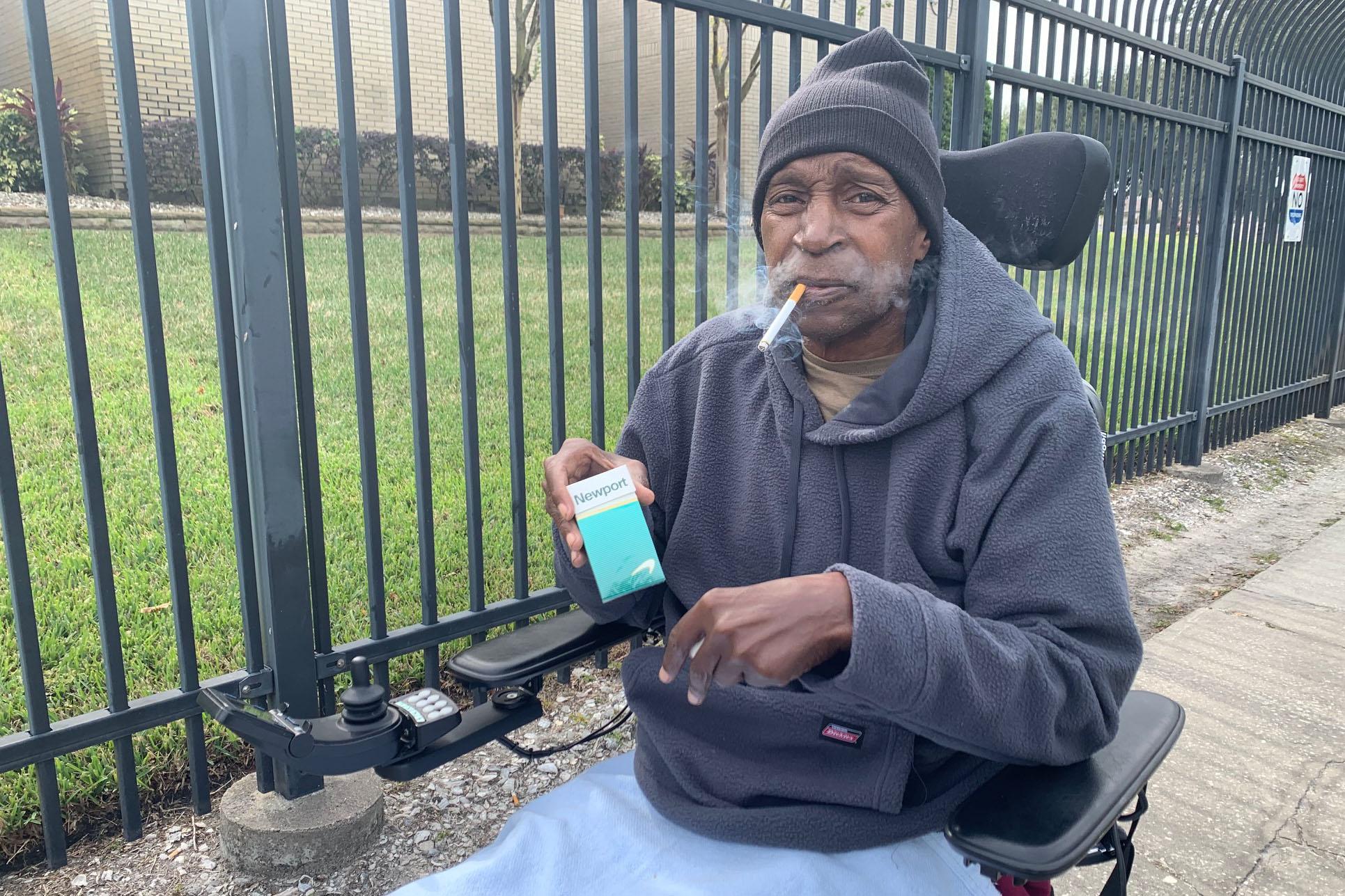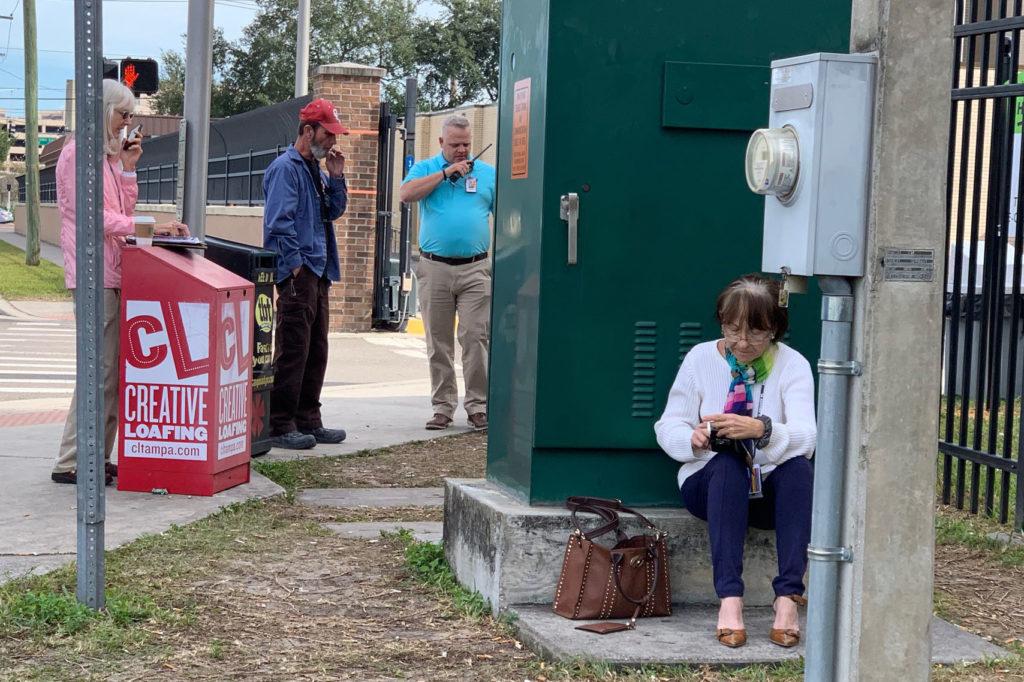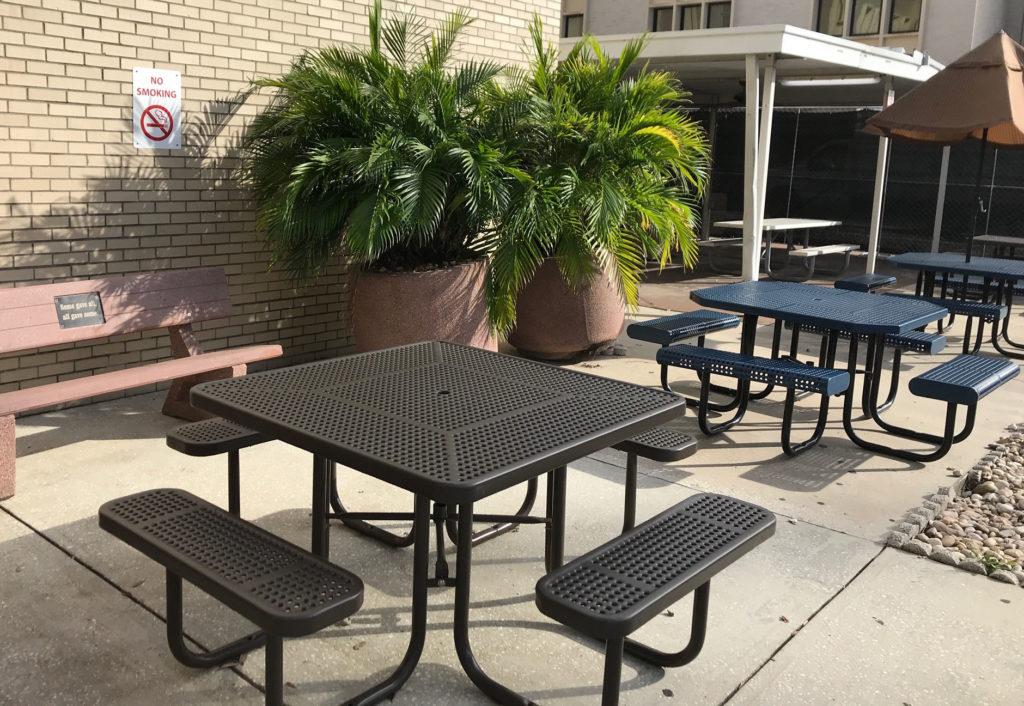
Air Force veteran Ronald West, 70, sat in his wheelchair just outside the fence that encloses the James A. Haley Veterans' Hospital grounds in Tampa. It was a cold day for Florida, so he wore a sweatshirt and a winter hat, and he was wrapped in a blanket.
He lit a Newport cigarette, his second since he wheeled himself out of his hospital room for a smoke.
It was West's third week there for a spinal cord injury, and he said he's been coming outside a few times a day because smoking is no longer allowed on VA property.
"It actually sucks," he said. "They had designated smoking areas, and that's what the veterans were adhering to, but now no smoking on the campus? Come on."
West was not alone on the sidewalk. The hospital fence was lined with smokers, most sporting employee badges and wearing scrubs, plus a few more patients. Army veteran Tom Rodgers stood with his cane farther down the block. He comes to the VA hospital for his lung disease and other medical needs. He was angry to find out about the smoke-free policy.
"We risked our lives in Vietnam over 50 years ago, and now they're telling us you can't have a cigarette?" he said.
Patients are not the only ones griping. When the VA announced in August that the policy change would also apply to staff, the largest union of VA workers filed a grievance. The American Federation of Government Employees argues the ban violates an existing contract that guarantees workers "reasonably accessible designated smoking areas."
VA officials say the problem was that some people weren't sticking to those areas.
"We had a lot of problems where patients would be walking into their medical appointments and would have to walk through people smoking," said Dr. Dawn Johnson, who promotes smoking cessation at the Tampa VA.
Signs throughout the campus inform people about the change. Johnson said there are still smokers who miss the message, but when they're spotted by hospital staff, they're given "Quit Cards" to inform them of the ban and suggest ways to stop smoking.
Eventually, VA hospitals will enforce the policy with citations and fines, but many, like the one in Tampa, are taking time to educate first.

"Some of our patients only come here once a year, and if they didn't hear about it we can't hold them responsible for it," Johnson said.
When announcing the policy change, VA Secretary Robert Wilkie called it, "consistent with our mission to promote a healthy environment for patients, visitors, and employees at our facilities and is an important element of improving our health care system."
"It will reduce the harmful effects of smoking, including exposure to second and third-hand smoke, as well as increase safety and reduce fire hazards caused by smoking," he continued in a statement.
Thousands of other health care facilities have already banned smoking. Research shows that the policies improve public health, and most patients and employees support them.
Studies also indicate that despite initial backlash from opponents, the bans don't affect employee retention. Three other VA unions agreed to the change.
Still, smoking has long been connected with military culture. The Centers for Disease Control and Prevention says more than a third of veterans started using tobacco after they entered the service, although less than 15% who use the VA smoke now.

Veteran Colleen Danielson was already smoking before she joined the Marines in the 1980's, but said it was a huge part of her life.
"I used it, I thought, as stress management," she said. "And you know in the Marines we got a few extra breaks for when we smoked, we were outside a little bit more."
Danielson quit cold turkey years ago. Now she's a peer support specialist at the Tampa VA who helps other vets quit. The agency provides counseling, a helpline, and nicotine replacement products like patches, lozenges, and gum.
Johnson said smokers typically make multiple attempts before they finally quit for good, and she encouraged vets to take advantage of a mix of resources in order to treat the problem effectively.
Tom Rodgers and Ronald West, the two veterans who were smoking on the sidewalk, said they have no interest in quitting. Still, both said the policy isn't going to stop them from going to the VA.
"It's their rules, they're taking care of me, so I'll follow them," West said.
This story was produced by the American Homefront Project, a public media collaboration that reports on American military life and veterans. Funding comes from the Corporation for Public Broadcasting.
Copyright 2019 North Carolina Public Radio – WUNC. To see more, visit North Carolina Public Radio – WUNC.9(MDEyMDcxNjYwMDEzNzc2MTQzNDNiY2I3ZA004))








